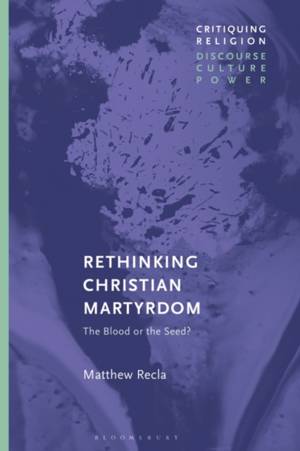
- Afhalen na 1 uur in een winkel met voorraad
- Gratis thuislevering in België vanaf € 30
- Ruim aanbod met 7 miljoen producten
- Afhalen na 1 uur in een winkel met voorraad
- Gratis thuislevering in België vanaf € 30
- Ruim aanbod met 7 miljoen producten
Omschrijving
This book argues that we have been mistaken about the fundamental assumption that Christianity is the key to understanding the "Christian" martyr. Examining martyrdom in early Christian history, Matt Recla argues that the violent deaths of martyrs, real and imagined, were appropriated for Christian institutional life. Through deconstructing martyrdom and appreciating the complexity of the martyr, we recognize martyrdom not as a socio-historical phenomenon inherent to particular ideologies, and not as a religious "identity" but as the institutional co-optation of violence. The Christian apologist Tertullian argued that the blood of the martyrs was the seed of the Church, but while the seed may be the key to martyrdom, the blood is the key to the martyr.
The book shows how martyrs exceed the bounds of institutional narrative. Centering analysis of martyrdom first around the martyr's existential difference and the complex biological, psychological, and socio-cultural factors that lead to willing death, this book sheds new light on the motivations of martyrs, our fascination with them, and the parasitic relationship of religion to violent death. In challenging long-held beliefs about the praiseworthiness of martyrdom, this book is of interest to scholars of religion as well as those concerned about the relationship between religion and violence.Specificaties
Betrokkenen
- Auteur(s):
- Uitgeverij:
Inhoud
- Aantal bladzijden:
- 232
- Taal:
- Engels
- Reeks:
Eigenschappen
- Productcode (EAN):
- 9781350184299
- Verschijningsdatum:
- 18/04/2024
- Uitvoering:
- Paperback
- Formaat:
- Trade paperback (VS)
- Afmetingen:
- 156 mm x 234 mm
- Gewicht:
- 326 g

Alleen bij Standaard Boekhandel
Beoordelingen
We publiceren alleen reviews die voldoen aan de voorwaarden voor reviews. Bekijk onze voorwaarden voor reviews.








